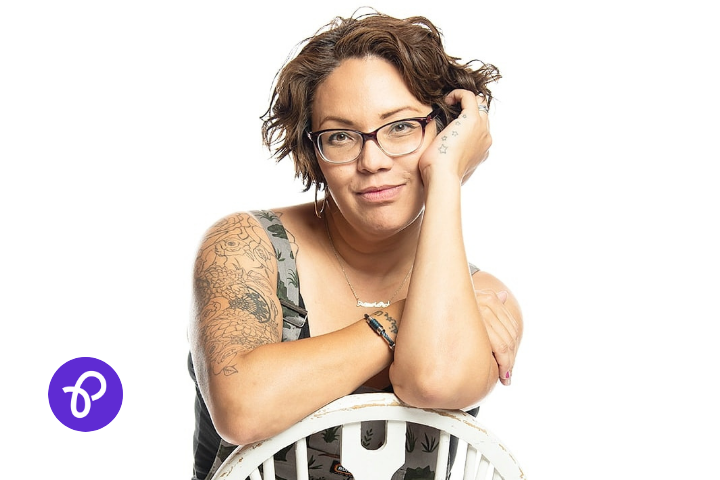All Articles
6 min read
The Disabled Person’s Guide to Surviving Easter
Written by
Georgina, Founder of Purpl
Published on
April 17, 2025

Easter is coming and though some people are excited for family times or events, some of us are dreading it and are already feeling the overwhelm creeping in!
With its bright colours, loud gatherings, and social expectations, Easter can be an overwhelming time for many people. For people who are disabled or neurodivergent, the sensory load, social pressure, and changes to routine can become not only stressful but debilitating.
While others might view Easter as a joyful break, for some disabled and neurodivergent people, it often means navigating a complex maze of accessibility barriers, sensory overload, and social fatigue.
So, let’s look at why Easter can be such a challenging time, and offer some practical strategies and solutions to reduce overwhelm, take control, and prioritise your wellbeing.
Let’s normalise that not everyone loves a social event!
Why Easter can be Overwhelming
Easter is typically associated with family get-togethers, religious services, school holidays, chocolate egg hunts, and community events. But underneath the surface, several factors can trigger stress and discomfort:
1. Sensory Overload
Shops filled with bright packaging, loud music, and artificial lighting. Religious services with incense and crowded spaces. Children’s events packed with noise and activity. All of these can overwhelm sensory processing systems, especially for autistic people or those with sensory processing disorder.
One of our members is the mum of a 12-year-old autistic child, Alfie. She told us that he becomes physically distressed when visiting busy supermarkets around Easter due to the high-pitched promotional jingles and crowds. His mum tends to try to shop during the quiet periods but often they are during school times, and Alfie does still want to go and choose his easter egg.
2. Changes to Routine
Neurodivergent people, including those with autism or ADHD, often rely on routine. The long weekend, school closures, and disruption to work schedules can cause anxiety or disorientation.
There are also people who live with energy limiting conditions who have learnt to pace themselves around routine. When this is lost, it can be incredibly difficult to deal with and this can have knock-on effects that are still about even when the ‘too many chocolate eggs’ bellyache has passed!
3. Social Pressure
Family expectations to attend meals, travel to relatives, or participate in religious rituals can be exhausting, both mentally and physically. Disabled people often feel pressured to “push through” their symptoms to avoid disappointing others.
When I use a wheelchair, I find the pressure from extended family to attend Easter lunch at a non-accessible venue causes anxiety and pain. But it is easy to feel that you have to ignore your own needs to accommodate everyone else.
4. Food and Dietary Challenges
People with specific dietary needs, due to allergies, diabetes, sensory preferences, or gastrointestinal conditions, may find it hard to navigate meals out, especially if they are home cooked by family members or community. There is a lack of understanding around dietary needs.

Strategies to Reduce Easter Overwhelm
While Easter might bring unique challenges, there are actionable ways to protect your wellbeing and create a season that works for you, not against you.
1. Establish Boundaries Early
Communicate your limits and needs to friends, family, and carers well in advance. It’s okay to decline invitations, request alternative arrangements, or leave early.
- Use scripts like: “Thank you for the invite, but I’ll need to skip this year for my own health,” or “Can we meet somewhere quieter or more accessible?”
2. Create Your Own Routine
While external routines might change, you can still build a temporary one for the Easter period. This could include scheduled quiet time, medication reminders, sensory-friendly activities, or planned meals.
- Use visual schedules, alarms, or written plans to provide structure.
3. Prepare Sensory Supports
If you know you’ll be in a high-stimulation environment, bring noise-cancelling headphones, sunglasses, fidget tools, or scented items that calm you. Practice deep pressure or grounding techniques before and after events.
- Apps like Calm Harm, Breathing Space, or Headspace can help regulate emotions.
4. Reframe the Holiday
You don’t have to participate in Easter the way others do. Redefine it on your own terms. That might mean watching your favourite film in PJs with a hot water bottle, planting seeds, or crafting in a quiet room.
- Your joy doesn’t have to look like mainstream joy, celebrate what brings you comfort.
5. Use Low-Energy Communication
When overwhelmed, communication can feel impossible. Pre-prepare messages or “spoonie cards” that explain your needs. You can also use text messages, emojis, or symbols to convey feelings quickly.
- Example: A coloured card system (red = need space, yellow = unsure, green = okay to talk) works well for people who are non-verbal or semi-verbal during shutdowns.
6. Pace Yourself
If you live with fatigue, pain, or sensory issues, energy management is key. Prioritise events that matter most to you and plan rest before and after. Use the “Spoon Theory” to visualise your energy.
- Break events into stages (e.g., attend just the meal, not the whole day).
7. Have an Exit Strategy
This is the biggie for me! If you decide to attend an event, plan an exit strategy. Agree with a trusted person in advance about how and when you’ll leave. Bring items that help you recover afterward, such as a blanket, pain medications, weighted lap pad, heat pads or audio book.
Two of the Purpl team admitted that they have to leave parties early so often that one has the nickname ‘Cinderella’ (as they alway leave before midnight!) and the other has the nickname ‘Au Revoir’ (as they are well known to do a ‘french exit’)!

How to be a Disability Ally this Easter
These difficulties and barriers may not all affect you, but they could well affect the people you love. You can be a great ally to the disabled and neurodivergent community by being aware and sensitive to people’s needs.
Follow our guide and consider things like noise sensitivity, dietary requirements, the need for a quiet space, accessibility and understanding that if your guest leaves early or doesn’t make it, it’s not personal to you, it’s personal to them.
You could consider things like:
Sensory Easter Egg Hunts: for blind and visually impaired people, Abilitymum on tiktok shared this video with beeping easter eggs!
Nomo Chocolates: Vegan, Nut free, Dairy free, Egg free chocolate that most people can enjoy and Purpl members can get 18% off!
Euans Guide: an access guide by disabled people for disabled people. Be an ally and check the venue for accessibility for your group.
Ask Questions and Listen to the Answer: Everyone is unique, and people with the same impairment will have different experiences, so ask what your friends, family and guests need and listen to the answer. If you can help remove a barrier, then do it!
Finding Support: UK Organisations & Charities
If Easter becomes too overwhelming, or if you just need to connect with others who understand, these UK-based services offer support, advice, and community:
1. National Autistic Society (NAS)
Provides extensive resources on managing sensory overload, routine changes, and social anxiety during holidays.
2. Mind
Offers mental health support, crisis lines, and holiday wellbeing tips for people with anxiety, depression, or sensory issues.
- Website: Mind website here
- Infoline: 0300 123 3393
3. Scope
A disability equality charity offering online communities, helplines, and advice for disabled people across all impairments.
- Website: Scope website here
- Helpline: 0808 800 3333
4. The PDA Society
Supports individuals and families with Pathological Demand Avoidance including holiday-specific tips.
- Website: PDA website here
5. The Blurt Foundation
Focuses on mental health and neurodivergent-friendly self-care strategies. Great for low-energy tips.
- Website: Blurt website here
6. Rethink Mental Illness
Offers support for people with complex mental health needs and crisis intervention, especially during overwhelming seasons.
- Website: Rethink website here
7. Carers UK
Supports unpaid carers who may be navigating Easter overwhelm alongside loved ones with additional needs.
- Website: Carers UK website here
8. Purpl Private Facebook Group
Peer to peer support from lots of Purpl members, you’re not alone!.
- Website: Private Facebook group here

Final Thoughts
Easter doesn’t have to be a time of dread. By recognising your needs, planning ahead, and prioritising self-compassion, it’s possible to transform the season into something manageable, maybe even joyful.
Whether you want a quiet few days with minimal demands, or a modified version of celebration that suits your energy and access needs, you are allowed to centre your wellbeing.
There’s strength in saying no. There’s courage in asking for help. And there’s a whole community of disabled and neurodivergent people across the UK rooting for you!

Sam Cleasby is a disabled artist and activist with a PG Cert in Disability Studies, she’s an award winning writer and public speaker and works as Marketing Manager for Purpl. She has three adult children, one cat, two dogs, eight chickens, one duck and three duck eggs in an incubator due any moment! She loves animals, nature and creativity and uses her experiences of illness and disability to promote positive change in the disabled community.
Are you a Purpl member?
If you are a disabled person living in the UK, you could join the UK’s first and fasted growing disabled discount site! Don’t take our word for it! We have thousands of members saving money every week with Purpl!

Related Discounts
LEGOLAND® Windsor Exclusive Disabled Discount: 10% off Legoland Standard Tickets
Shark UK Disabled Discount: 9% off Shark UK includes sale
Jacamo Disabled Discount: 20% off when you spend £30
